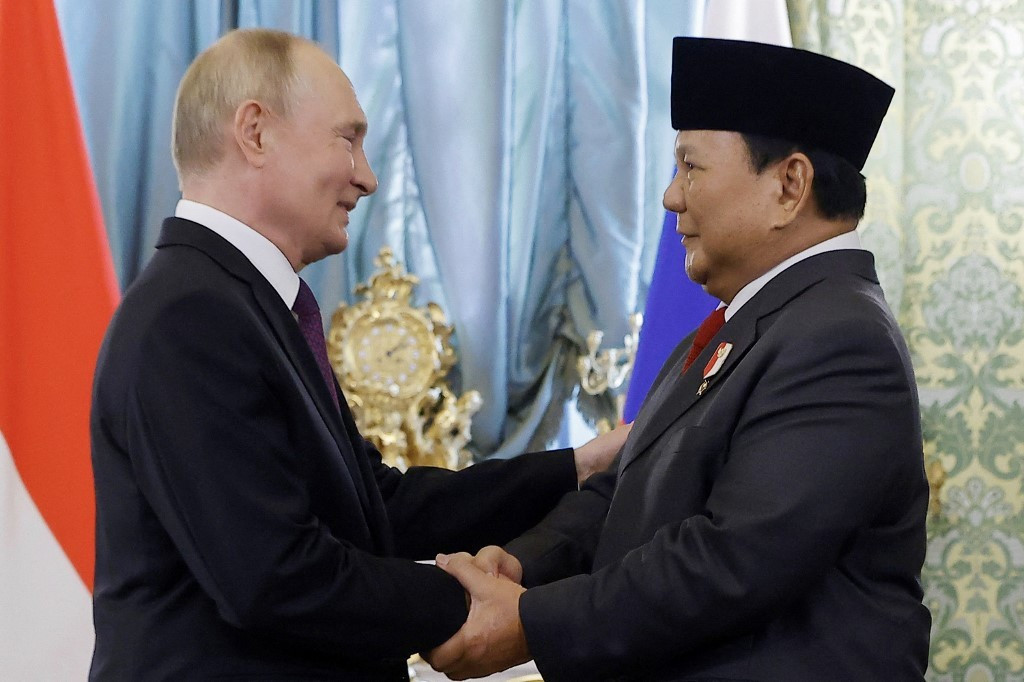News
Is non-aligned Indonesia shifting further away from West?
Tenggara Strategics July 3, 2025 Russian President Vladimir Putin (left) shakes hands with then Indonesian president-elect Prabowo Subianto on July 31, 2024, during a meeting at the Kremlin in Moscow, Russia. Prabowo will meet Putin on June 18 on his first visit to Russia since taking office, the Foreign Ministry said on June 12, as Southeast Asia's biggest economy seeks to boost ties with Moscow. (AFP/Pool/Maxim Shemetov)
Russian President Vladimir Putin (left) shakes hands with then Indonesian president-elect Prabowo Subianto on July 31, 2024, during a meeting at the Kremlin in Moscow, Russia. Prabowo will meet Putin on June 18 on his first visit to Russia since taking office, the Foreign Ministry said on June 12, as Southeast Asia's biggest economy seeks to boost ties with Moscow. (AFP/Pool/Maxim Shemetov)
“Don’t read too much into it,” said President Prabowo Subianto on his decision to turn down the invitation to meet with the leaders of wealthy Western countries in the Group of Seven (G7) in Canada this month, going instead to meet with Russian President Vladimir Putin.
Prabowo paused from his speech at the St Petersburg International Economic Forum, which was also attended by Putin, to address the concerns that his decision was seen in some quarters as a snub, and that non-aligned Indonesia is shifting closer to the Russia-China camp in the ongoing big-power rivalry.
“I gave my commitment to attend this forum before they [the G7] invited me […] We want to be friends with everybody,” the Indonesian leader said.
The G7 summit would have given Prabowo, inaugurated as president in October, a rare chance to meet with the leaders of the powerful Western countries, including United States President Donald Trump, whom he has not yet met. Not many leaders are invited to this prestigious group, and Prabowo would have been a special guest in the Canadian town of Kananaskis.
Yet, his St Petersburg speech did not come across as convincing that Indonesia would remain neutral in the ongoing big power rivalry, with veiled criticisms of the US on the one hand, and a lavishing of praise for China and Russia on the other.
He said Indonesia would not follow the philosophies of “the biggest and most powerful power in the world” and described Russia and China as leaders that “never had double standards” and are defenders of “the downtrodden [and] the oppressed.”
Although the global political landscape is rapidly polarizing into two camps, Prabowo in his speech is still convinced that multipolarity is the way forward, where Indonesia, the fourth-largest country in the world, will be able to exercise its active and independent foreign policy.
Although professing to be non-aligned, this should not to be taken that Indonesia will maintain equal distance between the two blocs. It has leaned toward one or the other, without ever aligning with either, as it pursues its national interests.
Under then-president Joko ”Jokowi” Widodo in 2014-2024, Indonesia economically leaned closer toward China, but Prabowo as defense minister in the last five years forged closer defense and security ties with the US. Now that he is president, early speculation that the US-educated former Army general would shift Indonesia to the center or even closer to the West has proved to be wrong.
Indonesia is shifting away from the West, and more precisely, from the US.
One of the first orders of business after his inauguration in October was for Indonesia to apply to join BRICS, which groups emerging market economies that include China and Russia. The group’s agenda includes moving away from the use of US dollars and challenging the West’s dominance in the global economic and financial structure. Apparently at Moscow’s insistence, Indonesia was admitted to the group as early as January, while other countries that applied at the same time have had to wait their turn.
Prabowo also made China his first foreign sojourn as president in November, although he immediately proceeded to Washington afterward. He tried to meet with Trump, then as president-elect, but had to resort to a phone call.
Since taking over, Prabowo has left the foreign policy community in Indonesia guessing about the direction he is taking, including his attitude toward the US.
Prabowo’s failure to name an Indonesian ambassador to Washington, which has been vacant for two years, is perceived as him not attaching too much priority to the relationship. The US embassy in Jakarta is also currently without an ambassador.
Last week, Indonesia virtually gave up trying to dissuade the Trump administration from imposing high tariffs on its imports, with the delegation saying that it had done all it could, and that now it is up to Washington to respond.
On the escalating tension in the Middle East, while Indonesia was quick to condemn Israel’s attack on Iran as a gross violation of international law, the Presidential Palace and the foreign ministry have not commented on last week’s US attack on Iran. By comparison, when Russia invaded Ukraine in 2022, Indonesia called for peace and later joined the United Nations General Assembly in condemning Moscow’s military action.
Prabowo has not visited Washington, but that is probably just as well, seeing how Trump has humiliated several heads of states paying him a visit to the White House.
What we've heard
Internal sources within the Foreign Ministry have said that Indonesia’s growing relationship with Russia is due to the former’s recent admission to BRICS. Indonesia considers the organization as a national priority, and Russia has welcomed the country’s aspirations with open arms.

